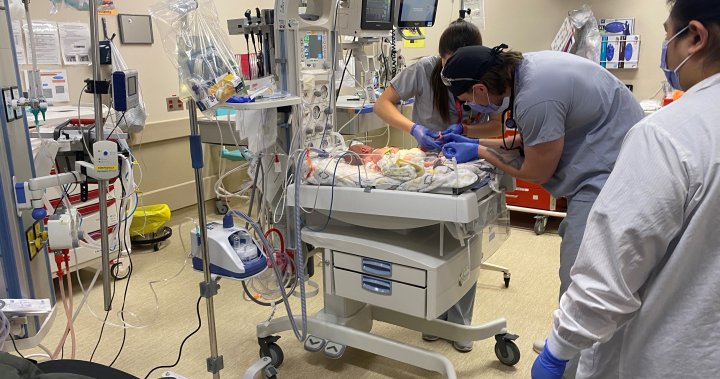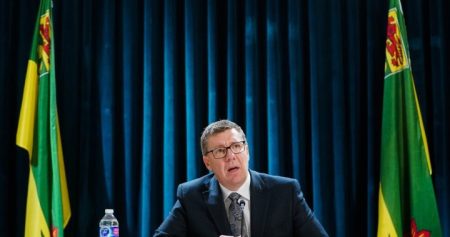A Kelowna family’s harrowing experience with their newborn son’s medical emergency has brought the critical shortage of pediatricians at Kelowna General Hospital (KGH) into sharp focus. Nine-day-old Roman, born prematurely, experienced severe respiratory distress, prompting his parents to rush him to the emergency department. What followed was a frantic scene, with medical staff working tirelessly to stabilize the infant. The Stringers, Roman’s parents, were informed that intubation and resuscitation might be necessary, a terrifying prospect for any parent. The trauma room, filled with 17 medical professionals, became a stark reminder of the severity of the situation. The parents faced the agonizing possibility of losing their child.
Adding to the family’s anxiety was the revelation that no pediatrician was on call at KGH that night. As Roman’s condition deteriorated, the medical team explored the possibility of transferring him to B.C. Children’s Hospital via air ambulance. They relied heavily on consultations with a pediatrician at B.C. Children’s Hospital to determine the correct medication dosages and treatment plan, highlighting the strain on resources and the potential delays in care caused by the pediatrician shortage. This incident tragically underscores the warnings issued in September by the Kelowna Emergency Department Physician Group regarding service disruptions in pediatric care at KGH. The ongoing unfilled shifts have created a precarious situation for families needing specialized pediatric care.
This incident is not an isolated occurrence. The shortage of pediatricians at KGH is a systemic issue that has been brewing for some time. The Kelowna Emergency Department Physician Group issued a public advisory in September warning of potential service disruptions related to pediatric care, a clear indication of the strain on resources. Since then, numerous shifts have gone unfilled, leaving the hospital vulnerable to situations like the one experienced by the Stringer family. This highlights a critical gap in the healthcare system, one that puts vulnerable infants and children at risk. The absence of a dedicated pediatrician on call forces emergency room staff to rely on external consultations, potentially delaying crucial interventions and adding to the stress experienced by families in crisis.
The B.C. Health Minister, Josie Osborne, has deferred addressing the issue, stating it is best handled by Interior Health. Interior Health (IH), in its statement, acknowledged the existing contingency plans in place for such service interruptions, relying on a network of hospitals and medical staff within IH and across the province. However, these contingency plans, while necessary, do not address the root cause of the problem: the critical shortage of pediatricians. While IH points to two additional pediatricians expected to join the KGH team in early 2025, this offers little solace to families facing immediate medical emergencies. The health authority’s ongoing national and international recruitment efforts, while commendable, are a long-term solution that does not address the immediate crisis.
The Stringers’ experience serves as a stark reminder of the real-world consequences of this shortage. While Roman, diagnosed with a viral infection, is thankfully recovering well in the neonatal intensive care unit (NICU), his family’s ordeal underscores the urgency of this issue. They hope their story will serve as a catalyst for change, prompting immediate action to address the pediatrician shortage before a potentially fatal case occurs. The reliance on contingency plans, while necessary, is not a sustainable solution. The system needs a permanent fix, one that ensures adequate staffing levels to provide timely and specialized care to children.
This incident raises serious questions about the sustainability of the current healthcare system in Kelowna, specifically regarding pediatric care. The lack of readily available pediatric specialists puts undue pressure on emergency room staff and exposes families to unnecessary stress and anxiety. While contingency plans exist, they cannot replace the expertise and immediate availability of a dedicated on-call pediatrician. The long-term solution, recruiting and retaining pediatricians, requires immediate and sustained attention to ensure that families like the Stringers have access to the specialized care their children need, when they need it. The need for more pediatricians is not simply a matter of convenience; it’s a matter of ensuring the health and safety of the community’s most vulnerable members.
The Stringer family’s experience highlights the precarious situation facing families in Kelowna and underscores the urgent need for a long-term solution to the pediatrician shortage. While Roman’s recovery is a welcome relief, the incident serves as a wake-up call, demanding immediate action to prevent future families from facing similar, potentially tragic, circumstances. The focus must shift from reactive contingency plans to proactive recruitment and retention strategies to ensure that KGH can consistently provide the level of pediatric care the community deserves. This is not just about filling shifts; it’s about building a robust and reliable pediatric care system that can meet the needs of a growing community.










